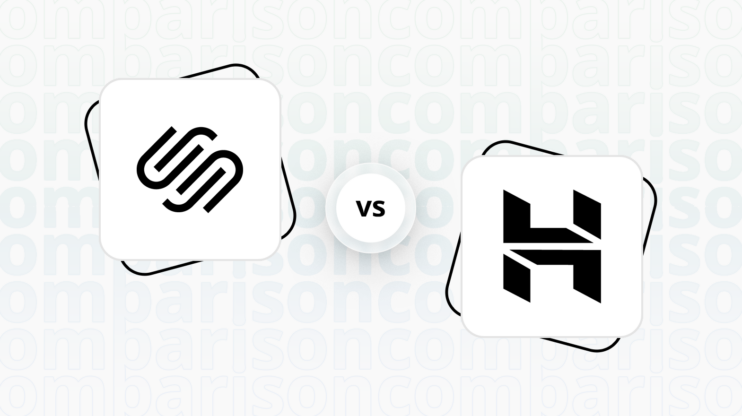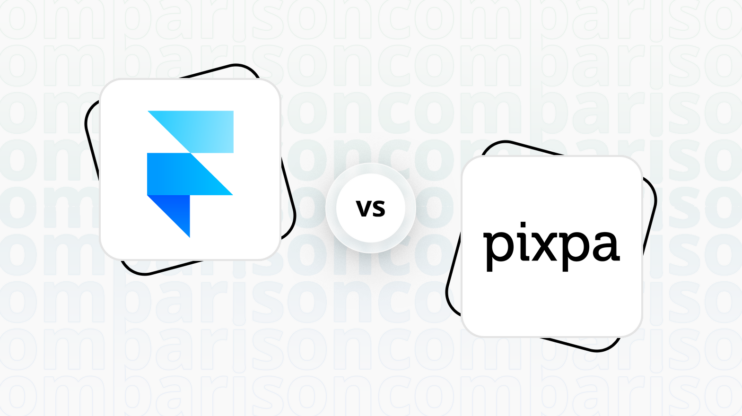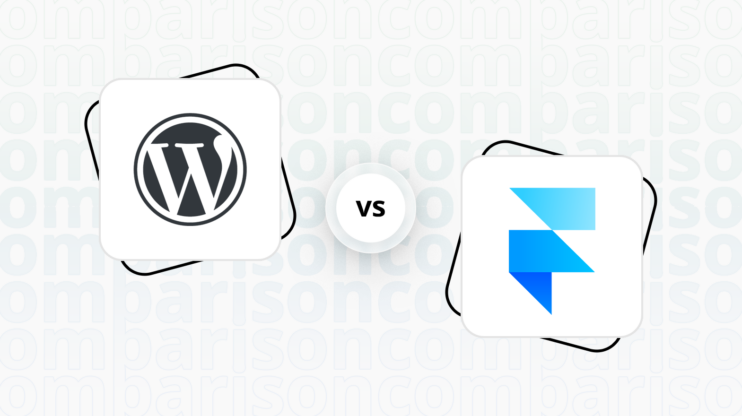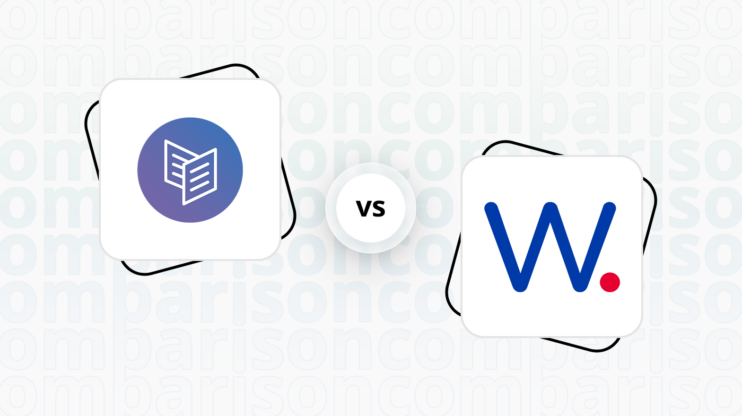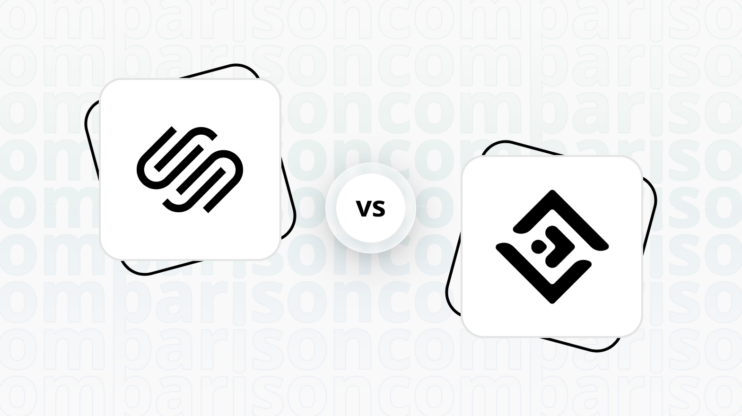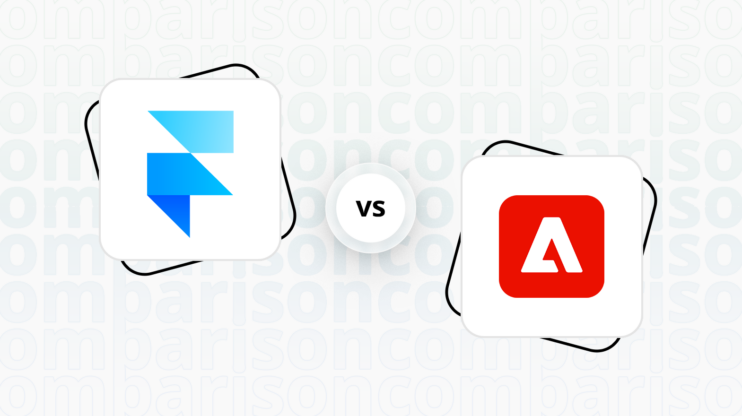Final verdict
Jimdo and Web.com cater to different user needs, with Jimdo emerging as the more versatile and user-friendly option.
-
Jimdo (Overall Grade: 7.2/10)
excels with its user-friendly interface, diverse template selection, and strong ecommerce features. It’s particularly suited for beginners and small businesses looking for an easy-to-use platform with solid design flexibility and ecommerce capabilities. Jimdo’s AI-driven tools and comprehensive hosting solutions further enhance its appeal to users seeking a hassle-free website building experience. -
Web.com (Overall Grade: 5.8/10)
, while offering a robust platform with a variety of features, falls short in comparison to Jimdo in terms of design flexibility, ease of use, and ecommerce functionality. It does, however, stand out for its customer support and AI capabilities, making it a viable option for users who prioritize these aspects and are willing to navigate a slightly steeper learning curve.

|

|
|
|---|---|---|
|
Design functionalities & templates |
6.4 |
7.2 |
|
Ease of use |
6.4 |
8.0 |
|
Ecommerce |
6.3 |
7.0 |
|
Website Editors |
6.6 |
7.8 |
|
Product testing options |
0.2 |
6.4 |
|
Price |
7.4 |
7.5 |
|
Hosting quality |
5.9 |
6.7 |
|
Website speed optimization |
5.8 |
7.6 |
|
Plugins/extensions and integrations |
6.7 |
7.4 |
|
Marketing features |
7.0 |
7.2 |
|
Customer support |
7.3 |
6.8 |
|
Website security |
7.6 |
8.3 |
|
AI capabilities |
7.3 |
6.0 |
|
User management |
5.2 |
5.8 |
Best for ecommerce
 6.3
6.3
 7.0
7.0
Verdict
: While both platforms offer essential ecommerce features, Jimdo takes the lead with a higher score and a more comprehensive set of tools for online selling.
-
Web.com
: Offers basic ecommerce functionalities suitable for small businesses starting to explore online sales. It provides a selection of ecommerce templates, product listing, and payment gateway integration, making it a viable option for those new to ecommerce. -
Jimdo
: Stands out with its user-friendly approach and a slightly better ecommerce score. It supports a wider range of ecommerce features, including inventory tracking, no transaction fees, and discount codes, catering well to small to medium-sized businesses looking to grow their online presence.
Best for informational & business websites
 6.5
6.5
 7.4
7.4
Verdict
: Jimdo edges out Web.com for informational and business websites, thanks to its higher score and user-friendly features.
-
Web.com
: Offers a straightforward platform with drag-and-drop functionality and a decent selection of templates. It’s suitable for users without coding skills, emphasizing mobile responsiveness and incorporating SEO tools. However, its score of 6.5 suggests there are areas where it could improve to better serve informational and business website creators. -
Jimdo
: With a score of 7.4, Jimdo stands out for its ease of use and flexibility in design, making it a better choice for those looking to create detailed, personalized websites. It caters well to small businesses and individuals with its user-friendly platform and a wider range of templates compared to Web.com.
Detailed comparison
Design functionalities & templates
Design FunctionalitiesRepresents how well each platform allows for creative design and customization of websites.Score Components:
- Template Variety (30%): Range and quality of design templates.
- Customization (30%): Flexibility and options for design alterations.
- User Interface (20%): Ease and intuitiveness of the design process.
- Responsiveness (10%): Adaptability to different devices and screen sizes.
- Innovation (10%): Unique design features and tools.
 6.4
6.4
 7.2
7.2
🏆
Winner: Jimdo.
Jimdo offers a more diverse range of templates and greater customization flexibility, making it the preferred choice for users seeking detailed personalization.
Web.com offers over 100 website templates designed to cater to a broad spectrum of industries and personalization needs. These templates are structured to be straightforward in customization, allowing users to easily adapt their chosen designs to suit their unique brand identity through the platform’s editor.
On the other hand, Jimdo offers a diverse range of templates suitable for various industries and user preferences, with options to preview and select templates easily. The platform allows flexibility in changing templates for existing websites and also provides a “Blank Template” for custom designs, catering to both beginners and advanced users.


Get a head start on website creation with AI
Create a custom website tailored to your business needs 10X faster with 10Web AI Website Builder!
Ease of use
Ease of useReflects the platform’s overall user-friendliness.Score
Components:
- Learning curve (40%): Quickness and ease of getting started.
- Interface design (30%): Simplicity and intuitiveness of layout.
- User guidance (20%): Quality of tutorials and support.
- Flexibility (10%): Adaptability to various user skills.
 6.4
6.4
 8.0
8.0
🏆 Winner: Jimdo
. With an ease of use score of 8.0, Jimdo is more user-friendly than Web.com, which has a score of 6.4. Jimdo’s AI-driven website builder, Jimdo Dolphin, simplifies the design process, making it particularly easy for beginners to create a website. On the other hand, Web.com’s website builder is more suitable for intermediate designers seeking to enhance their design capabilities.
Learning Resources
🏆 Winner: Jimdo
. Both platforms offer learning resources, but Jimdo provides user-friendly tools that cater to both beginners and those with some experience in website design. The platform also has a significant community presence across various platforms, with over 20 million website builders. In contrast, Web.com lacks a large community of users.
For ecommerce
EcommerceMeasures the platform’s effectiveness in supporting online business activities.Score Components:
- Ecommerce themes and templates (20%): Variety and design of templates.
- Product management (25%): Ease of managing and organizing products.
- Payment options (25%): Variety and convenience of payment methods.
- Ecommerce features (20%): Features for managing an ecommerce store.
- Integration (10%): Compatibility with external e-commerce tools and services.
 6.3
6.3
 7.0
7.0
When it comes to ecommerce, both Web.com and Jimdo offer a range of features to help businesses sell online. However, Jimdo scores slightly higher than Web.com in this category, with a score of 7.0 compared to Web.com’s 6.3.

|

|
|
|---|---|---|
|
Ecommerce themes and templates |
5.5 |
6.5 |
|
Product page customization |
6.0 |
6.8 |
|
Payment processing and commissions |
6.5 |
7.5 |
|
POS capabilities |
4.0 |
5.0 |
|
Payment gateways |
7.0 |
7.0 |
|
Product numbers |
5.0 |
6.0 |
|
Additional ecommerce features |
6.0 |
6.5 |
Web.com ecommerce features:
- Product listing
- Marketing Features
- Shipping options
- Payment Gateways integration
Jimdo ecommerce features:
- Product details and variations
- Inventory tracking
- No transaction fees
- Discount codes and promotions
- Email marketing
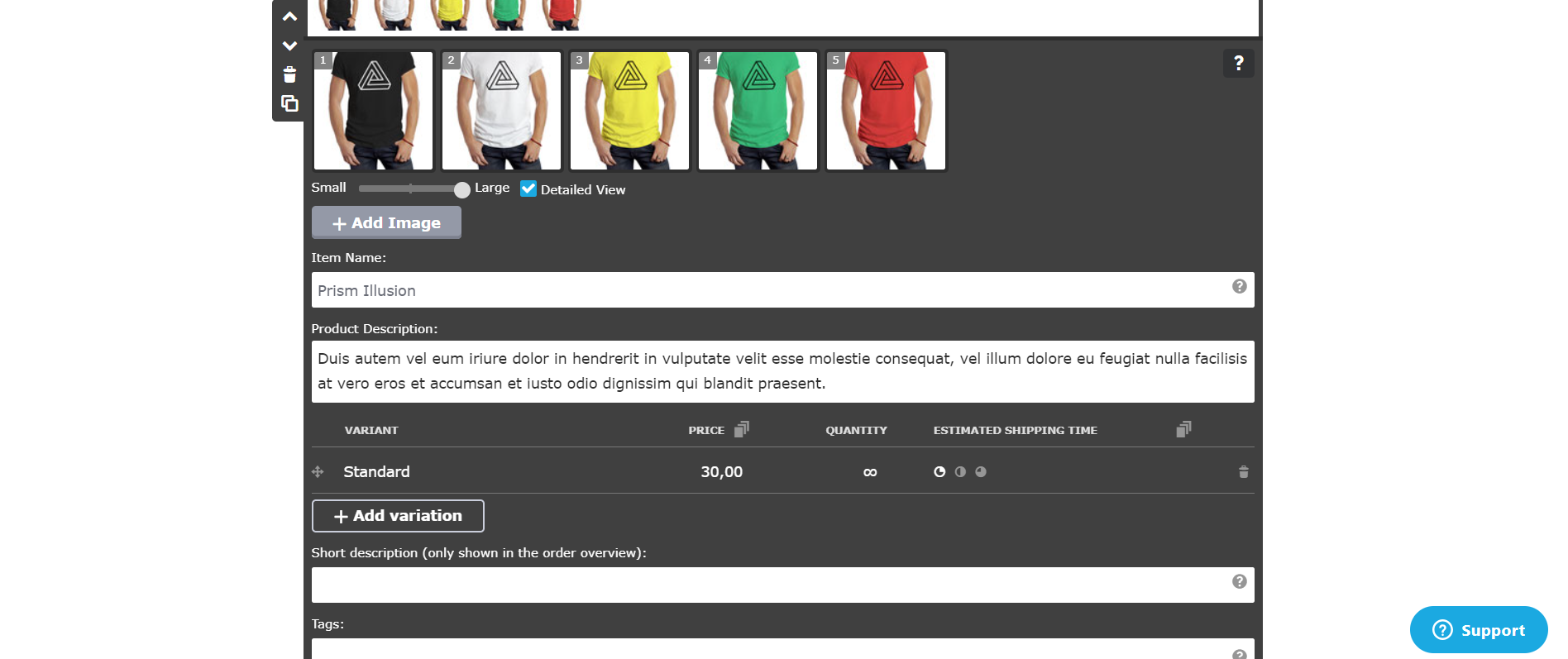
Ecommerce themes & templates
Web.com offers around 15 ecommerce templates designed to help businesses quickly launch and customize their online stores. These templates are compatible with Web.com’s website builder, facilitating straightforward customization and integration for digital storefronts. On the other hand, Jimdo’s ecommerce templates offer a diverse range of pre-designed themes, ensuring a mobile-friendly and smooth shopping experience. The drag-and-drop interface allows for easy customization of colors, fonts, and layouts.
Product page customization
Web.com’s website builder offers a suite of tools for e-commerce stores, including product category management for organizing inventory and improving navigation, and product listing features for adding detailed product information and images. Users can create and manage product variants to accommodate items with multiple options, enhancing the customer shopping experience. On the other hand, customizing a product page on Jimdo involves using its user-friendly interface to personalize various elements. You can edit text, add images, adjust layouts, and modify design elements like colors and fonts to showcase your products effectively.
Payment processing
The Web.com website builder facilitates eCommerce activities by supporting popular payment gateways like PayPal, Stripe, and all major debit and credit cards, ensuring a wide array of payment options for customers. Jimdo facilitates payment processing through various popular gateways like PayPal, Stripe, Mollie, and more, depending on your location and plan. While Jimdo doesn’t impose transaction fees, individual payment gateways may have their own charges.
Website Editors
Website EditorsEvaluates the platforms’ website building and editing capabilities.Score Components:
- Customization tools (40%): Range and power of editing features.
- Editor usability (30%): User experience within the editor.
- Design flexibility (20%): Freedom in layout and design changes.
- Update and maintenance ease (10%): Simplicity of updating and maintaining the site.
 6.6
6.6
 7.8
7.8
🏆
Winner: Jimdo
. Jimdo, with a score of 7.8, offers two main modes: Jimdo Dolphin and Jimdo Creator. Dolphin, an AI-driven tool, is ideal for beginners and creates websites based on user responses to a series of questions, streamlining the web design process. On the other hand, Jimdo Creator provides a more traditional website building experience with greater customization options, including a drag-and-drop editor and HTML widgets, catering to users seeking more control over their site’s design.
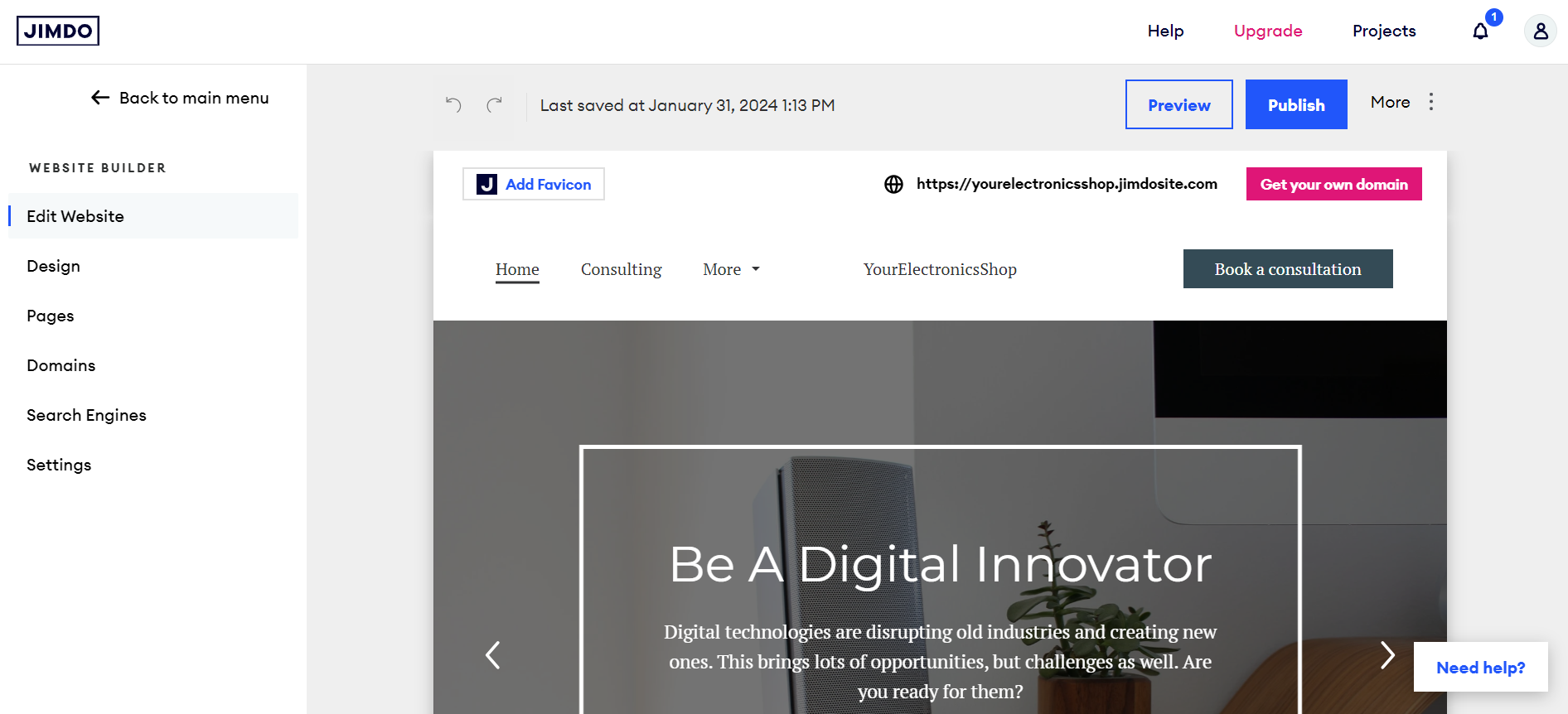
Web.com’s website builder, scoring 6.6, offers a user-friendly platform with a variety of templates and a drag-and-drop interface for easy customization. It supports basic e-commerce capabilities suitable for small businesses, alongside features like analytics, social media integration, and email services. However, for more advanced functionalities like promotional pop-ups, calendars, or comprehensive blogging tools, the platform may fall short unless users are willing to add custom code.
Mobile editor/app
 0
0
 8.0
8.0
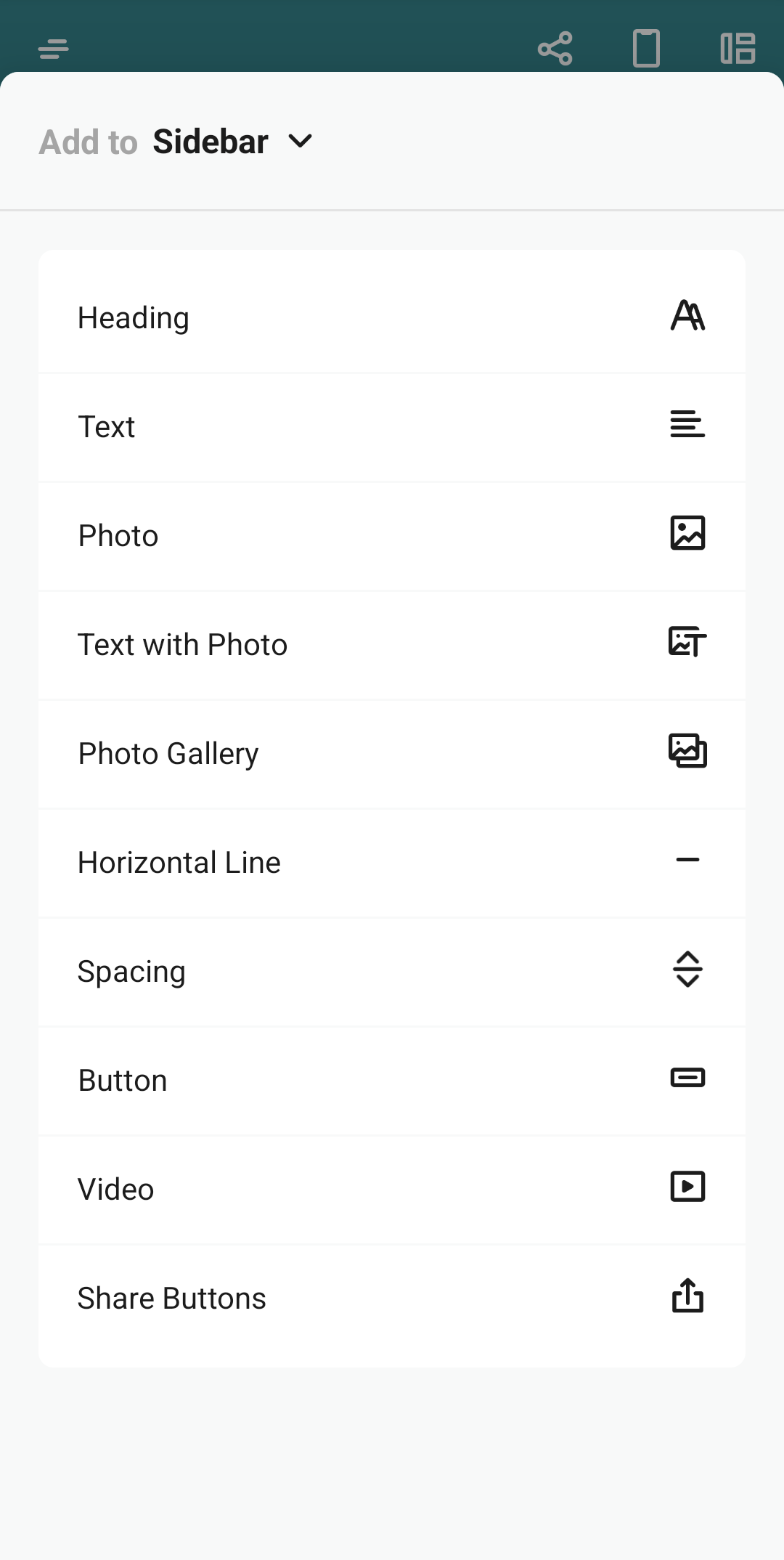
🏆
Winner: Jimdo
. When it comes to mobile editing, Jimdo clearly outshines Web.com. Jimdo offers a mobile editor app, allowing users to create and manage their websites directly from their smartphones or tablets. This app provides a convenient way to edit and update your site on the go, including adding or modifying content, adjusting design elements, and managing your online store.
On the other hand, Web.com does not have a dedicated mobile editor app, which limits its accessibility and convenience for users who prefer to manage their websites on mobile devices.
In summary, Jimdo receives a higher rating due to its mobile editing capabilities and convenience, while Web.com is less accessible for mobile users due to the lack of a dedicated mobile editor app.
Product testing options
Product Testing OptionsAssesses the options for trying out platform features before commitment.Score Components:
- Trial quality (40%): Extent and usefulness of the trial or free version.
- Feature accessibility (30%): How many features are available to test.
- Trial duration (20%): Length of the trial period.
- Ease of transition (10%): Smoothness of moving from trial to paid plans.
 0.2
0.2
 6.4
6.4
Overall Result
:
Jimdo wins
. Jimdo scores 6.4, significantly higher than Web.com’s 0.2. Jimdo offers a free plan to explore basic features and a 14-day money-back guarantee for all paid plans, allowing users to test more advanced options. On the other hand, Web.com does not offer a free or trial version, and it’s not possible to test any of the website builder’s features before purchasing any of their plans. They do offer a 3-day money-back guarantee, but this is significantly shorter than Jimdo’s.

|

|
|
|---|---|---|
|
Free Plan |
No |
Yes |
|
Trial Duration |
No |
No, however they have 14 days money back guarantee |
|
Testing Premium Features |
Not possible before purchasing |
Basic features with free plan, advanced options with paid plans |
|
Money Back Guarantee |
3-day money back guarantee |
14-day money-back guarantee for all paid plans |
Price
PriceLooks at the cost-effectiveness and value for money of each platform.Score Components:
- Plan value (40%): What each pricing tier offers.
- Transparency and clarity (30%): Clearness of pricing structures.
- Flexibility of plans (20%): Range of options to suit different budgets.
- Hidden costs (10%): Additional expenses not included in the plan.
 7.4
7.4
 7.5
7.5
Web.com and Jimdo have similar price scores, indicating that they offer comparable value for money.
Both builders offer a range of plans to suit different needs and budgets, with discounts available for annual billing. Neither builder offers specific enterprise plans.
| Price range |

|

|
|---|---|---|
|
Free |
No offering at this amount. |
Play ($0/month): Basic, entry-level plan offering limited features, ideal for testing Jimdo’s capabilities. Includes 500MB storage and up to 5 website pages. Limited ecommerce functionality. |
|
$0-$10 |
No offering at this amount. |
Start ($9/month): Aimed at small projects or businesses just starting out. Provides 5GB of storage and up to 10 website pages, along with SEO tools for online visibility. Not directly focused on ecommerce. Value for price: 6.0 |
|
$10-$17 |
Website ($19.99/month): AI-powered Website Builder. Free domain & domain privacy for 1 year. Professional email for 3 months. SSL Certificate for 1 month. 1 hour expert design support. Social & email marketing tools. Value for price: 6.5 |
Business ($19/month): Designed for small to medium-sized online stores, offering ecommerce features without transaction fees. Includes selling on Facebook and Instagram, and various payment options. And up to 50 website pages. Value for price: 8.0 |
|
$17-$25 |
Website + Marketing ($24.99/month): All features in the Website plan. Enhanced marketing tools. Appointment scheduling. Value for price: 7.0 |
Grow ($15/month): Targets growing businesses needing more space and features. Offers more flexibility but still lacks dedicated ecommerce capabilities compared to the Business plan. Provides 20GB bandwidth with up to 50 website pages. Value for price: 7.0 Basic ($15/month): Up to five forwarding email addresses, up to 10 website pages, convenient payment methods. Value for price: 6.5 |
|
$30+ |
eCommerce ($34.99/month): All features in the Website + Marketing plan. Online store with secure checkout. Sell on multiple marketplaces like Facebook, Instagram, Amazon, eBay, etc. Value for price: 8.5 |
VIP ($39/month): Provides comprehensive features for large or expanding online stores, including unlimited storage and priority support and unlimited website pages. Includes professional design review and no transaction fees. Value for price: 9.0 Unlimited ($39/month): Offers unlimited bandwidth and storage, up to 20 forwarding email addresses and unlimited website pages. Includes priority support and professional design reviews. Value for price: 9.5 |
location. As a result in rare cases the prices displayed here can differ from the ones you see on their
websites.
Hosting quality
Hosting
qualityExamines the reliability and performance of the hosting solutions.Score Components:
- Uptime (40%): Consistency and reliability of website availability.
- Speed (30%): Loading times and performance.
- Bandwidth and storage (20%): Sufficiency of resources provided.
- Data centers (10%): Quality and distribution of hosting infrastructure.
 5.9
5.9
 6.7
6.7
Winner: Jimdo
. Jimdo offers a more comprehensive hosting service with shared, cloud, and managed hosting options. It also provides an uptime of 99.5% and a distributed network of secure data centers. On the other hand, Web.com offers shared hosting with unlimited storage and daily backups but does not provide uptime statistics or guarantees and does not disclose the locations of its data centers.

|

|
|
|---|---|---|
|
Do they offer hosting? |
Yes, with unlimited storage and daily backups | Yes, included in all of their plans. With storage from 500MB storage and 2GB bandwidth on free plan, up to unlimited storage and bandwidth on highest plan. Jimdo provides free daily backups to ensure data restoration, however users can’t backup their website manually. |
|
Type of hosting: |
Shared hosting |
Shared Hosting, Cloud Hosting, Managed Hosting |
|
Uptime: |
Web.com does not provide uptime statistics or guarantees |
Uptime: 99.5% |
|
Uptime Guarantee: |
No | No |
|
Data Centers: |
Web.com does not disclose the locations of its data centers | While Jimdo doesn’t publicly disclose the exact locations of its data centers, they utilize a distributed network of highly secure and reliable facilities spread across multiple regions. |
Website Speed Optimization
Website Speed OptimizationEvaluates optimization of website loading timesScore Components:
- PageSpeed Score (30%): Google’s score indicating performance optimization.
- Loading Time (30%): The average time until a website is fully interactive.
- Mobile Optimization (15%): Optimization effectiveness for mobile devices.
- Resource Optimization (15%): Optimizing images, scripts, and other heavy resources.
- CDN Usage (10%): Use of CDN to enhance speed across geolocations.
 5.8
5.8
 7.6
7.6
🏆 Winner: Jimdo
Both Web.com and Jimdo prioritize website performance and page speed, but Jimdo takes the lead with a more comprehensive approach to speed optimization and a clear focus on improving Core Web Vitals.

|

|
|
|---|---|---|
|
Focus |
Mobile Optimized design, Code Minification, Caching, Image Optimization |
Content Optimization, CDN, Image optimization, Caching, Mobile Responsive design |
|
Performance Tools |
Not specified |
Not specified |
|
Key Strategies |
Mobile Optimized design, Code Minification, Caching, Image Optimization |
Content Optimization, CDN, Image optimization, Caching, Mobile Responsive design |
|
Load Times |
Varies depending on optimization and website complexity |
Varies widely, dependent on optimization |
|
Page Speed Scores Range |
Not specified |
Scores vary; influenced by plugins, images |
|
Core Web Vitals Improvement |
Not specified |
Optimizing LCP, Enhancing FID, Improving CLS |
Jimdo’s approach to speed optimization includes content optimization, use of a content distribution network (CDN), image optimization, caching, and mobile responsive design. These strategies help to ensure that websites built with Jimdo load quickly and perform well. Jimdo also places a strong emphasis on improving Core Web Vitals, with a focus on optimizing Largest Contentful Paint (LCP), enhancing First Input Delay (FID), and improving Cumulative Layout Shift (CLS).
Web.com also prioritizes website speed and performance, with strategies for speed optimization including mobile optimized design, code minification, caching, and image optimization. However, Web.com does not provide specific information on their Core Web Vitals improvements, which puts them at a disadvantage compared to Jimdo in this comparison.
Get a head start on website creation with AI
Create a custom website tailored to your business needs 10X faster with 10Web AI Website Builder!
Plugins and integrations
Plugins and integrationsMeasures the range and effectiveness of additional plugins and integrations.Score Components:
- Variety of options (40%): Range of available add-ons.
- Integration smoothness (30%): Ease of integrating plugins into the site.
- Quality of plugins (20%): Functionality and reliability of the options.
- Custom integration capabilities (10%): Support for custom or third-party integrations.
 6.7
6.7
 7.4
7.4
🏆 Winner: Jimdo.
With a score of 7.4, Jimdo leads in this category. It offers a range of plugins and extensions, with POWr and Elfsight being major providers. These tools enhance website functionality and cater to diverse business and marketing needs. On the other hand, Web.com, with a score of 6.7, provides a suite of plugins and integrations for websites built on its platform, including features for email marketing, social media engagement, analytics, and eCommerce capabilities. However, Jimdo’s free plugins and user-friendly customization options give it an edge over Web.com.
Marketing Features
Design FunctionalitiesRepresents how well each platform allows for creative design and customization of websites.Score Components:
- Template Variety (30%): Range and quality of design templates.
- Customization (30%): Flexibility and options for design alterations.
- User Interface (20%): Ease and intuitiveness of the design process.
- Responsiveness (10%): Adaptability to different devices and screen sizes.
- Innovation (10%): Unique design features and tools.
 7.0
7.0
 7.2
7.2
🏆
Overall Winner: Jimdo
. Jimdo edges out Web.com with a slightly higher score, indicating a more comprehensive set of marketing tools. Both platforms offer a similar range of features, but Jimdo’s user-friendly interface and integrated analytics may provide a more seamless experience for users.

|

|
|
|---|---|---|
|
SEO Tools |
|
|
|
Email Marketing |
|
|
|
Blogging |
|
|
|
Social Media Integration |
|
|
|
Analytics and Reporting |
Basic website analytics and Google Analytics integration |
Integrated analytics for monitoring website traffic |
|
Ads and Promotions |
Tiered selection of marketing tools across different packages |
Tools for website and product marketing |
Customer Support
Customer supportEvaluates the quality and availability of support options.Score Components:
- Response time (40%): Speed of support responses.
- Support quality (30%): Effectiveness and helpfulness of the support.
- Availability (20%): Range of support channels (phone, chat, email).
- Resource richness (10%): Quality of self-help and educational materials.
 7.3
7.3
 6.8
6.8
🏆 Winner: Web.com
. Web.com takes the lead in this category with a customer support score of 7.3, compared to Jimdo’s score of 6.8. Web.com offers comprehensive customer support, including email, live chat, and 24/7 phone support. Their phone line is recommended for immediate support needs, making it a reliable option for users.
On the other hand, Jimdo offers various customer support channels, including email support, a call center, a knowledge base on their website, and social media support. However, they do not currently offer live chat support. It’s important to note that support options may vary based on the user’s plan. Despite these offerings, Jimdo falls short in this category due to its lower customer support score.
Security
SecurityLooks at the platforms’ security measures and data protection.Score Components:
- Data protection (40%): Safeguards for user and customer data.
- SSL and encryption (30%): Implementation of secure connections.
- Compliance (20%): Adherence to industry security standards.
- Regular updates (10%): Frequency of security updates and patches.
 7.6
7.6
 8.3
8.3
🏆
Winner: Jimdo
. Jimdo’s security measures are comprehensive, including a strong firewall, DDoS protection, HTTPS and TLS encryption, and SSL certificates for domains. They also prioritize data protection and GDPR compliance, using AI for personalization without data training, employing IT security measures, and anonymizing web analytics data.
Web.com, on the other hand, offers security measures through its partnership with SiteLock Security, providing cloud-based services that scan websites for malware and vulnerabilities. They also offer SSL certificates, website backup solutions, and cybersecurity measures to protect mobile devices and tablets from online threats. However, their security score is lower than Jimdo’s, making Jimdo the winner in this category.
AI Capabilities
AI capabilitiesMeasures the effectiveness of AI-driven features and tools.Score Components:
- Automation efficiency (40%): Impact of AI on streamlining processes.
- Personalization (30%): AI-driven customization for users or customers.
- AI-Assisted design (20%): Role of AI in website design and functionality.
- Data analysis (10%): Use of AI in interpreting user data and analytics.
 7.3
7.3
 6.0
6.0

|

|
|
|---|---|---|
|
AI Builder |
Web.com’s AI builder simplifies website creation |
Jimdo’s AI builder offers a hassle-free way to create websites |
|
AI Ecommerce Features |
Personalized product recommendations, automated inventory management, customer service chatbots, and data analysis tools |
AI-powered design suggestions for store layouts and image recommendations |
|
AI Content Generation |
AI Writer for versatile content creation in multiple languages |
|
|
Additional AI Features |
AI Domain Generator and AI Logo Builder |
AI-driven website layout generation |
🏆 Winner: Web.com
. With a score of 7.3, Web.com’s AI capabilities are more advanced and versatile, offering a range of tools for website creation, ecommerce, content generation, and branding. Its AI Writer supports content creation in multiple languages, and its AI Domain Generator and AI Logo Builder simplify key aspects of website design and branding.
Jimdo, with a score of 6.0, offers more basic AI capabilities focused on website creation. Its AI builder is user-friendly and ideal for users seeking a hassle-free way to establish a professional online presence. However, it lacks advanced AI features like content generation.

User Management
User ManagementAssesses the platforms’ capabilities in managing user roles, permissions, and accessibility.Score Components:
- Role Customization (40%): Flexibility in creating and defining user roles and
permissions. - Ease of Management (30%): User interface and tools for managing users.
- Access Control (20%): Effectiveness of access control measures for different user
levels. - Scalability (10%): Ability to manage a growing number of users efficiently.
 5.2
5.2
 5.8
5.8
🏆 Winner: Jimdo
. Both Web.com and Jimdo offer different approaches to user management.
- Web.com allows multiple user accounts, however the platform does not specify how many accounts are supported.
- Jimdo’s Free, Start, and Basic Shop Plans allow website management by a single owner. The Grow Shop Plan permits two editors, including the account owner and one collaborator. The Business Plan extends collaboration to five editors, consisting of the account owner and four collaborators. The Unlimited Plan provides unlimited editors, fostering a collaborative team environment. The VIP Plan, designed for online stores, does not specify a limit on editors for websites.
Web.com User Roles and Access Levels:
| Role | Description | Access Highlights |
|---|---|---|
| Primary | The main account holder or primary user. | Edit primary user info Purchase products Manage and renew products and services |
| Admin | Users with administrative privileges besides the primary. | Edit payment information Add/Edit/Delete user roles Manage and renew products and services Edit WHOIS Admin and Tech user info |
| Tech | Users with technical responsibilities. | Manage and renew products and services Edit WHOIS Admin and Tech user info |
Jimdo does not provide specific user roles and access levels.
Additional Features

|

|
|
|---|---|---|
|
SSL Certificate |
|
|
|
Custom Domain |
|
|
|
Free Custom Domain Included |
|
|
|
International Domains |
|
|
|
Mobile Responsive |
|
|
|
Page Speed |
|
|
|
Website Builder Mobile App |
|
|
|
Convert a Website To An App |
|
|
|
Website Analytics |
|
|
|
Multilingual Sites |
|
|
|
Multiple Users |
|
|
User Feedback
Unfortunately, there are no user reviews available for Web.com on the G2 platform, so we cannot provide a user feedback summary for this website builder.
Jimdo, on the other hand, has received mixed reviews from users. Positive feedback highlights its ease of use, no-code editor, and quick website development for basic sites. However, criticisms include outdated design, limited templates, and concerns about pricing transparency. Some users appreciate it for simple projects, while others find it lacking for more complex websites. Common issues include restricted SEO in the free tier, support limitations, and late responses. The overall impression suggests Jimdo may suit beginners but could be less ideal for those seeking advanced features or modern designs.
The making of this blog
We followed a clear, step-by-step process to write and research this article.
FAQ
Which platform is better for beginners, Web.com or Jimdo?
Can I use both Web.com and Jimdo for selling products online?
How do Web.com and Jimdo compare in terms of design flexibility and template options?
What are the major differences in pricing between Web.com and Jimdo?
Which platform offers better customer support, Web.com or Jimdo?
In terms of website speed and performance, which platform is better?
Which platform has better AI capabilities?
Can I manage multiple users on both Web.com and Jimdo?










